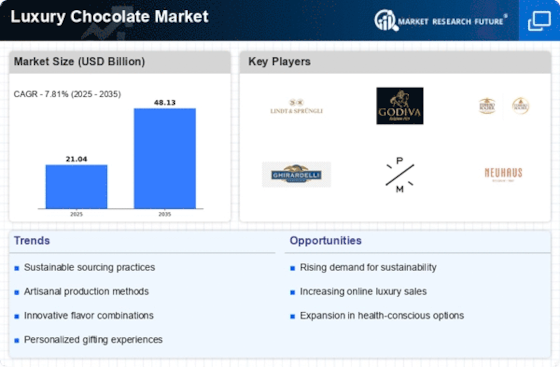Gift-Giving Culture
The enduring culture of gift-giving plays a pivotal role in the Luxury chocolate Market. Special occasions such as holidays, anniversaries, and corporate events often see luxury chocolates being chosen as premium gifts. Market data suggests that approximately 40% of luxury chocolate sales are attributed to gifting, highlighting the importance of this segment. Brands are capitalizing on this trend by offering elegant packaging and customizable options, making their products more appealing for gifting purposes. The Luxury Chocolate Market is thus likely to continue benefiting from this cultural practice, as consumers seek to express sentiments through high-quality chocolate gifts.
E-commerce Expansion
The rapid expansion of e-commerce platforms is reshaping the Luxury Chocolate Market. With the convenience of online shopping, consumers are increasingly turning to digital channels to purchase luxury chocolates. This shift is evidenced by a notable increase in online sales, which accounted for nearly 30% of total luxury chocolate sales in 2025. E-commerce not only provides access to a wider range of products but also allows brands to engage with consumers through personalized marketing strategies. As a result, luxury chocolate brands are investing in their online presence, enhancing user experience, and leveraging social media to reach potential customers. This trend indicates a significant transformation in how luxury chocolates are marketed and sold.
Health Consciousness
The increasing awareness of health and wellness among consumers appears to be a driving force in the Luxury Chocolate Market. As individuals seek indulgent yet healthier options, luxury chocolate brands are responding by incorporating organic ingredients, lower sugar content, and superfoods into their products. This trend is reflected in the market data, which indicates that the demand for dark chocolate, known for its health benefits, has surged. In 2025, the luxury chocolate segment is projected to witness a growth rate of approximately 5.5%, driven by consumers prioritizing quality and health. The Luxury Chocolate Market is thus adapting to these preferences, offering products that align with a more health-conscious lifestyle.
Experiential Marketing
Experiential marketing is emerging as a key driver in the Luxury Chocolate Market. Brands are increasingly focusing on creating memorable experiences for consumers, such as chocolate tastings, workshops, and factory tours. This approach not only enhances brand loyalty but also allows consumers to engage with the product on a deeper level. Market data indicates that brands employing experiential marketing strategies have reported a 15% increase in customer retention rates. As the Luxury Chocolate Market evolves, the emphasis on experiential marketing is likely to grow, as it aligns with the modern consumer's desire for unique and immersive experiences.
Artisanal and Craft Production
The rise of artisanal and craft chocolate production is significantly influencing the Luxury Chocolate Market. Consumers are increasingly drawn to products that emphasize craftsmanship, unique flavors, and small-batch production. This trend is reflected in the market, where artisanal chocolate brands have seen a growth rate of around 7% in 2025. These brands often highlight their sourcing practices, focusing on single-origin cacao and ethical production methods. As consumers become more discerning, the Luxury Chocolate Market is likely to see a continued shift towards these premium offerings, as they resonate with the desire for authenticity and quality.

















